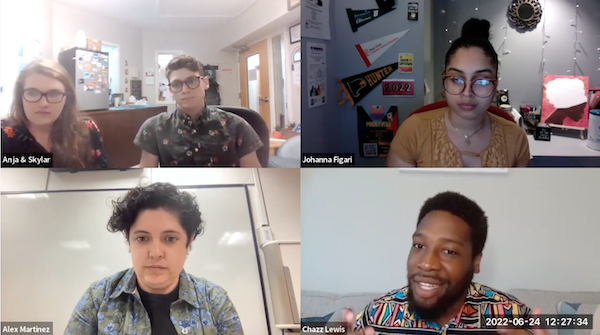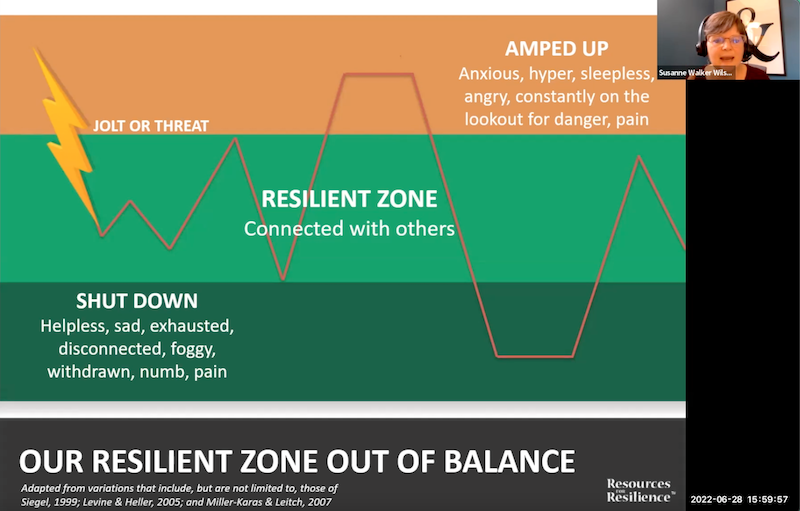In late June, Bank Street Graduate School hosted its 36th annual Infancy Institute, a three-day conference that offers training and intensive workshops for early childhood professionals who work with infants and toddlers. This year’s conference welcomed over 175 teachers, caregivers, early intervention specialists, home visitors, social workers, and others to reflect on their practice and learn new tools to enhance their work with young children.
Held in a hybrid format, the event gathered in-person participants at Bank Street’s campus while other professionals from across the country tuned in via livestream. The theme, “Beyond the Behavior: Understanding the Behavior of Children, Adults, and Ourselves,” invited attendees to take a closer look at the behavior of the children in their care as well as their own behavior to help reinvigorate their practice and be the best version of themselves in their work.
“The Infancy Institute is an opportunity for all of us to dig deeply into the worlds of infants, toddlers, families, and the professionals who support them,” said Margie Brickley, GSE ‘89, Co-Director, Infancy Institute, and Supervised Fieldwork Advisor and Course Instructor, Bank Street Graduate School. “Our conference is a generative space for knowledgeable infant/toddler practitioners to learn from each other every year.”
 This year, the keynote speaker was Dr. Chazz, a former educator and current social media influencer whose life work focuses on helping adults truly see, guide, and trust children. His in-person presentation was followed by a virtual keynote featuring a panel discussion with four educators who work with infants and toddlers in a variety of settings and in different capacities. Panelists included Johanna Figari, GSE ‘22, home visiting supervisor; Alex Martinez, GSE ‘18, head teacher, Bank Street Family Center; and Skylar Belt and Anja Mayr, infant teachers, Verner Center for Early Learning.
This year, the keynote speaker was Dr. Chazz, a former educator and current social media influencer whose life work focuses on helping adults truly see, guide, and trust children. His in-person presentation was followed by a virtual keynote featuring a panel discussion with four educators who work with infants and toddlers in a variety of settings and in different capacities. Panelists included Johanna Figari, GSE ‘22, home visiting supervisor; Alex Martinez, GSE ‘18, head teacher, Bank Street Family Center; and Skylar Belt and Anja Mayr, infant teachers, Verner Center for Early Learning.
During the discussion, Dr. Chazz posed a series of questions that invited the panelists to share more about their journeys as educators as well as some defining moments they’ve experienced in their current roles. Each panelist contributed to the questions, which built a constructive space to reflect on their practice and learn from others who do similar work.
When asked “what behavior do you find most challenging to deal with,” one panelist described tantrums and unpredictable meltdowns as being particularly challenging for her. Another named screaming in the classroom as something that can be dysregulating and disruptive to her focus.
For Figari, certain behaviors from parents or family members are most difficult. She said her biggest challenges come when she experiences gaps in communication with families, like when a parent doesn’t answer a previously-scheduled phone call or fails to attend an important meeting or event they had RSVP’d for. She explained that she often blames herself for these disconnections, questioning what she could have done better to nurture that engagement.
Dr. Chazz reminded us that, in situations like this, reframing our thinking and asking ourselves the harder questions can be beneficial. He encouraged us to question why a particular behavior may be happening and what circumstances out of our control may be influencing that behavior. To Figari, he suggested, “Maybe a better question is, ‘How can I better understand what’s going on and what that [family’s] struggle is?” He continued, “Parents are the other piece of the puzzle to who that child is.”
The group responded to several other questions that encouraged them to reflect on special moments in their work and to think about behavior through new lenses. Before wrapping up the discussion, Dr. Chazz and the panelists shared key takeaways from the conversation, acknowledging how valuable it was to be able to reflect in a shared space with like-minded educators, including celebrating their triumphs and being vulnerable about their struggles.
Conference attendees also had the unique opportunity to hear from featured speaker Susanne Walker Wilson, a renowned clinical social worker whose work focuses on early relational health. In her talk, Wilson shared trauma-informed and resiliency-focused tools for educators and caregivers to settle their nervous system, maintain regulation, and protect themselves from stress or burnout on the job, which can impact the children they work with.
According to Wilson, these simple strategies can help us maintain balance in the face of ongoing stress or trauma and are essential to building resilience in any work setting. “Each of us brings strengths, gifts, and resilience to our work every day,” she said. “And each of us bears significant stress, occasional sorrow, daily frustration, unavoidable risk, and sometimes even vicarious trauma through our day-to-day work with very young children and their families.”
 Wilson began with an overview of how the body and the brain respond to stress and trauma. She explained that each day, stressors can knock us out of our “resiliency zone” by amping us up, which causes feelings of anxiety, hyperactivity, and more, or shutting us down, which causes feelings like helplessness, sadness, and exhaustion. These stressors can be influenced by anything from mental health issues to personal life circumstances.
Wilson began with an overview of how the body and the brain respond to stress and trauma. She explained that each day, stressors can knock us out of our “resiliency zone” by amping us up, which causes feelings of anxiety, hyperactivity, and more, or shutting us down, which causes feelings like helplessness, sadness, and exhaustion. These stressors can be influenced by anything from mental health issues to personal life circumstances.
She went on to share tangible techniques that educators—and all of us—can use to settle our nervous system, bring us back to what she referred to as our “resiliency zone,” and increase our ability to connect and be compassionate. Examples of wellness techniques Wilson described are as simple as drinking water, taking a walk, leaning up against a wall, deep breathing, or anything that brings about physical body awareness. Doing so taps into the survival part of our brain, which is based solely on physical sensations. These types of sensations ground us and reinstate our ability to self-regulate.
“The way we mean grounding is that you’re looking for physical sensations of what is solid or steady or strong,” she said. “These are simple somatic wellness tools available to all of us within a minute.”
Wilson’s presentation was enlightening and informative, helping educators understand that in order to be the trusted, attuned caregivers our young children need, we must first regulate our own minds and bodies in the face of stressors to become the best version of ourselves.
Several workshops were held throughout the conference led by early childhood development experts, including Bank Street faculty and staff. Examples of workshop topics included “Building Blocks of Toddler Cognitive Development: Learning Activities Through Play,” “Empowering and Supporting Families through a Culturally-Sustaining Lens,” “Exploring Sensory Activities with Toddlers,” and “Parent Support Groups: Why Investing in Parent Support is Critical to Whole Child Care.”
The variety of workshops, including those held in Spanish, allowed participants to choose topics based on their experience level as well as their individual interests and areas of focus in their roles. For example, more experienced participants might choose a workshop about sensory integration theory while a newer professional might choose a session that equips them with techniques that can be immediately applied to their settings.
To learn more about the Infancy Institute, click here. For a full list of workshops and presenters, click here.